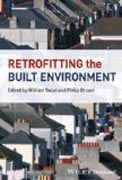
The physical upgrading of the existing domestic and industrial building stock to improve energy performance is an essential part of a transition to a low carbon society. Successfully retrofitting buildings to improve energy performance is not simply a technological challenge, it is a complex socio–technical problem that needs to be addressed in a co–ordinated way, utilising skills and knowledge from a range of industrial and academic backgrounds. Within both the academic and practitioner communities there is a growing understanding of the scale and nature of the problem, one which encompasses issues such as policy and regulation, people and behaviour, supply chain and process, as well as issues of technology. Retrofitting the Built Environment discusses the factors that impact on the retrofit problem, providing a clear analysis of the main issues that the academic and industrial communities must engage with to resolve the problems of domestic energy and retrofit. The book is divided into four broad sections: Understanding the Problem Policy and Regulation Implementing and Evaluating Retrofit People and Communities Academic and industrial researchers, policy makers and industry practitioners will find each section covers a mix of policy, technical and social science issues, presented by both academic and industry authors, giving a wide and detailed perspective of the issue. The Editors Will Swan is a Senior Lecturer in Buildings Retrofit in the School of the Built Environment at the University of Salford. He leads a number of projects in the field of sustainable retrofit, covering a number of topics including monitoring, behaviour and retrofit project delivery, as part of Salford’s Applied Energy and Buildings Research Group. He sits on the Greater Manchester Buildings Group and also is Chair of the Retrofit Innovation Group. Philip Brown is Director and Senior Research Fellow at the Salford Housing & Urban Studies Unit (SHUSU) at the University of Salford. He is the lead academic on end–use energy demand within the Applied Energy and Buildings Research Group, and sits on Greater Manchester’s Low Carbon Economic Area group for Customer Engagement. INDICE: List of contributors vii Foreword Kevin Anderson xv 1 Retrofitting the built environment: An introduction 1 Will Swan and Philip Brown PART 1 Understanding the problem 5 2 Achieving ‘systemic’ urban retrofit: A framework for action 7 Tim May, Mike Hodson, Simon Marvin and Beth Perry 3 Openness in household energy use: The new Housing Energy Fact File 20 Jason Palmer, Ian Cooper and Martin Hughes 4 Retrofit innovation in the UK social housing sector: A socio–technical perspective 36 Will Swan PART 2 Policy and regulation 53 5 A roadmap to significant reductions in energy use for existing buildings: The long view 55 Stephen Morgan 6 Thermal retrofit and building regulations for dwellings in the UK 67 Stephen Todd 7 Retrofitting existing dwellings: Lessons from the policy instruments of front–runners 81 Lorraine Murphy PART 3 Implementing and evaluating retrofit 97 8 Make no assumptions: The selection of domestic retrofit improvements 99 Charlie Baker, Luke Smith and Will Swan 9 Life cycle assessment of refurbishment strategies for historical buildings 113 Gianluca Ruggieri, Giovanni Dotelli, Paco Melià and Sergio Sabbadini 10 FutureFit: Lessons for the Green Deal from a retrofit large–scale project in UK social housing 128 Alexandra Willey 11 Energy monitoring in retrofit projects: Strategies, tools and practices 141 Richard Fitton PART 4 Peoples and communities 155 12 Engaging residents in multifamily building retrofits: Reducing energy consumption and enhancing resident satisfaction 157 Patricia Gee and Lucrezia Chiappetta 13 Ensuring energy efficiency at the individual level: Getting psychologically informed 170 Philip Brown 14 Barriers to domestic retrofit: Learning from past home improvement experiences 184 Becky Mallaband, Victoria Haines and Val Mitchell 15 Low–energy design for non–experts: Usability in whole house retrofit 200 Marianne Heaslip Index 225
- ISBN: 978-1-118-27350-0
- Editorial: Wiley–Blackwell
- Encuadernacion: Cartoné
- Páginas: 252
- Fecha Publicación: 27/09/2013
- Nº Volúmenes: 1
- Idioma: Inglés
